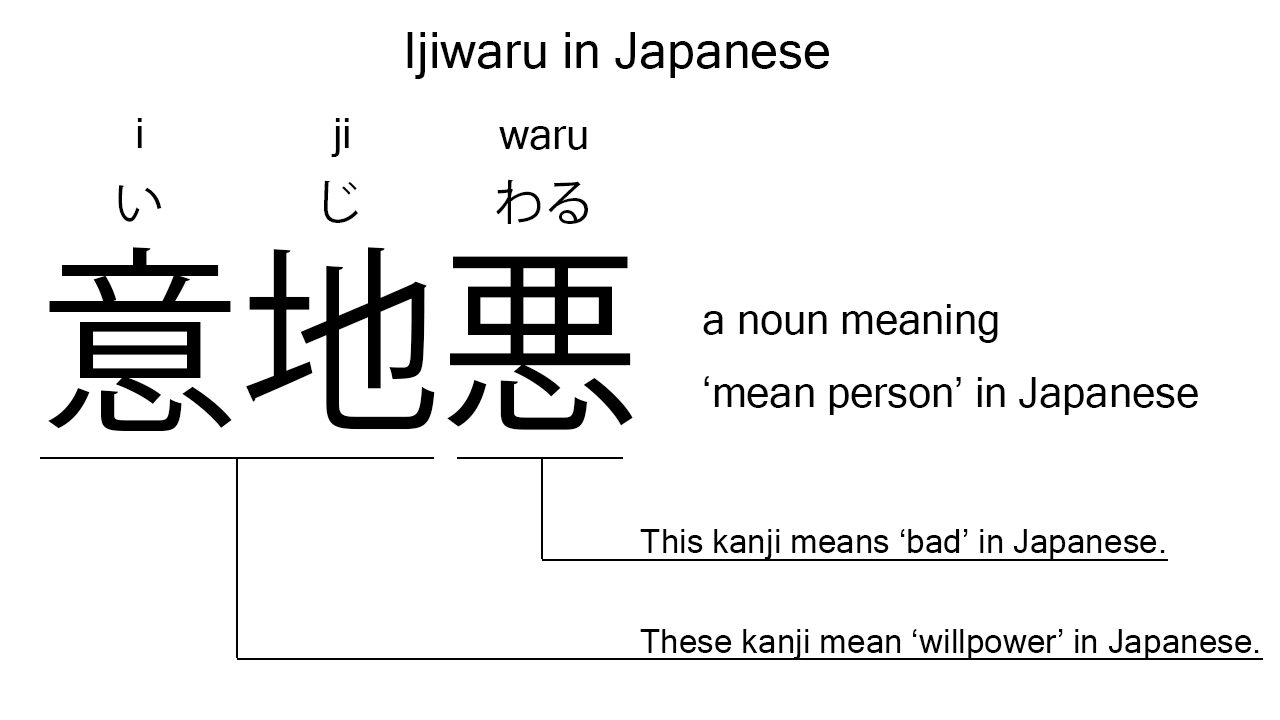What does “ijiwaru” mean in Japanese?
Native speakers say “ijiwaru” normally to mean ‘mean person’ in Japanese. Perhaps, some Japanese learners know this word as it is sometimes used in Japanese movies, songs, novels, manga, anime, and the like. In this blog post, however, I will explain this word in detail based on its grammatical components. And also, I will explain how to use it through example sentences. My explanations would help Japanese learners understand “ijiwaru” more clearly. Then, let’s get started!
Contents
Definition and meanings of “ijiwaru”
Let me start with the definition and meanings of “ijiwaru”.
- ijiwaru – 意地悪 (いじわる) : a noun meaning ‘mean person’ or ‘meanness’ in Japanese. This can also work as plural. Learn more about Japanese plural.
Native speakers use this noun to refer to a mean person or sometimes their meanness in Japanese.
The definition and meanings are not that difficult, I think. To understand this noun more clearly, however, let me explain its grammatical components in detail.
What does “ijiwaru” literally mean?
“Ijiwaru” consists of the following two components:
- iji – 意地 (いじ) : a noun meaning ‘willpower’ or ‘stubbornness’ in Japanese.
- waru – 悪 (わる) : a noun meaning ‘badness’ in Japanese. This can also mean just ‘bad’ in Japanese.
These two components tell us that “ijiwaru” literally means ‘bad willpower’ in Japanese. This literal interpretation is not in line with the actual meanings, but still understandable, I think. In Japanese, mean people can be considered as those who have bad willpower.

When we meet new Japanese words, we should check their components in detail to understand their meanings clearly and deeply. In many cases, grammatical components tell us a lot about the meanings of the words they form. Actually, here, we could get the better understanding of “ijiwaru” through the detailed check above.
So far, I’ve explained the definition and meanings of “ijiwaru” together with its grammatical components. Then, let me explain how to use it through the example sentences below.
Example #1: how to say “mean person” in Japanese
kanojo wa totemo ijiwaru desu – 彼女はとても意地悪です (かのじょはとてもいじわるです)
She is a very mean person.
Below are the new words used in the example sentence.
- kanojo – 彼女 (かのじょ) : a pronoun meaning ‘she’ in Japanese.
- wa – は : a binding particle working as a case marker or topic marker. In the example, this works after “kanojo” to make the subject in the sentence.
- totemo – とても : an adverb of degree meaning ‘very’, ‘much’, ‘so’, or such in Japanese. In the example, this works in front of “ijiwaru” to emphasize its meaning.
- desu – です : an auxiliary verb used after a noun or adjective to make it polite. Probably, this is well known as a part of Japanese desu form. In the example, this is used after “ijiwaru” to make it sound polite.
This is a typical usage of “ijiwaru”. In this example, it works together with the adverb of degree, “totemo”, to mean a ‘very mean person’ in Japanese.
Example #2: another usage of “ijiwaru”
kanojo no kareshi mo ijiwaru desu yo – 彼女の彼氏も意地悪ですよ (かのじょのかれしもいじわるですよ)
Her boyfriend is a mean person, too.
Below are the new word used in the example sentence.
- no – の : a case particle used after a noun or pronoun to make its possessive case. In the example, this is used after “kanojo” to make its possessive case, “kanojo no”, which means ‘her’ in Japanese.
- kareshi – 彼氏 (かれし) : a noun meaning ‘boyfriend’ in Japanese.
- mo – も : a binding particle making the subject word or the object word in a sentence with adding the meaning of ‘too’, ‘also’, or ‘as well’. In the example, this works after “kanojo no kareshi” to make the subject in the sentence with adding the meaning of ‘too’.
- yo – よ : a sentence-ending particle used to state the fact or idea in a soft way. As the definition suggests, this is used at the end of the example sentence to state the speaker’s idea softly. This has not been reflected in the English sentence, though.
This is another typical usage of “ijiwaru”. When we want to refer to a mean person or people in Japanese, this noun is a very good option.
Summary
In this blog post, I’ve explained the definition and meanings of “ijiwaru” in detail based on its grammatical components. And also, I’ve explained how to use it through the example sentences. Let me summarize them as follows.
- ijiwaru – 意地悪 (いじわる) : a noun meaning ‘mean person’ or ‘meanness’ in Japanese. This can also work as plural. Native speakers use this to refer to a mean person or sometimes their meanness in Japanese. This noun consists of “iji” and “waru”. These two parts literally mean ‘bad willpower’ in Japanese. This literal interpretation is not in line with the actual meanings, but still understandable, I think. In Japanese, mean people can be considered as those who have bad willpower.
Hope my explanations are understandable and helpful for Japanese learners.